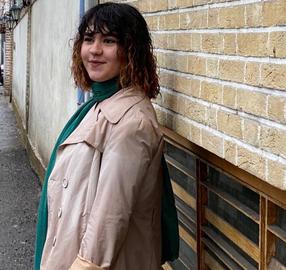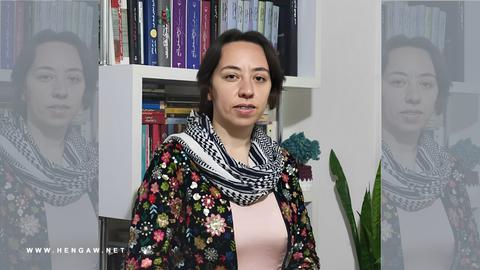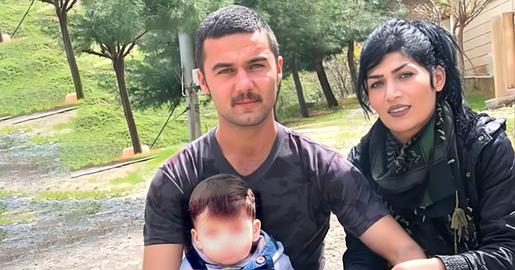Razieh Ebrahimzadeh is known as the first female political prisoner in Iran. Right up until her death on January 30, 2012, at the age of 87, she remained a committed communist revolutionary who held on to the ideals that sent her to prison under the monarchy. But neither her imprisonment, nor the tragic death of her son in prison, nor her years spent in self-imposed exile abroad, shook her firm belief in the communist Tudeh Party of Iran, and her book, “Memoirs of a Woman Member of the Tudeh Party,” is the written proof of this lifetime commitment.
The Working-Class Roots
Razieh Shabani Gholami was born in May 1925 in Tabriz, the provincial capital of East Azerbaijan, to a large working-class family. In her memoirs, she describes her father as a noble cook and laborer who worked hard so that his seven children could be educated and make something of themselves.
Razieh was the fifth child. Her sister had left school in the third grade because of their low income. Despite difficult conditions, she was able to attend Iran’s first primary school, which happened to open in Tabriz. "The monster of poverty pressed and hurt me with its rough, cruel claws. My father could not afford to pay for my education, or even for my chador. I had to wear a scarf when I went to school, which was regarded as profane at the time," she writes in her memoirs.
Because of that, the young Razieh faced the constant scolding of the headmistress. This particular problem, however, did not last more than a year or so, because, in January 1935 Reza Shah Pahlavi ordered that Iranian women stop wearing chador and veil.
Razieh was delighted. Nevertheless, she still had to wear a gray school uniform, with white collar and wristbands. The family’s living conditions were deteriorating every day and another of her sisters left school. It was hard for Razieh, too, to continue attending school. Her own circumstances were made more difficult because teaching in minority languages in Iran was forbidden and Razieh, whose mother tongue was Azeri, had to learn Persian at the same time.
In fourth grade, Razieh came to know a teacher called Ms. Baradaran who had a profound influence on her ideological leanings. Ms. Baradaran treated her kindly, she later recalled, and gave her self-confidence. But this joy did not last long because Ms. Baradaran was sent to another school. Razieh sat for her fifth grade examination in September instead of June due to a typhoid epidemic, and completed her sixth grade at the Church School Barnova in Tabriz.
The Allied Invasion and Troubled Times
Razieh’s youth coincided with the rise of the pro-Soviet, separatist Azerbaijan Democratic Party under the leadership of Jafar Pishevari. As she was in high school, her future husband, Reza Ebrahimzadeh, became one of the members of the so-called “Fifty-Three:” a group of Iranians arrested in Tehran for involvement in communist activities and sent to Qasr Prison.
On August 24, 1941, as World War II was raging, the Allied Forces attacked Iran. The Soviet army occupied the north of the country and the British took the south. In her memoirs, Ebrahimzadeh writes that her father was an excellent cook and before the war his salary had been 60 tomans a month — not enough for his large family. The war, however, cut that salary dramatically and forced the family to move to Tehran.
The family's life in Tehran took place under the shadow of war and famine. Together with her sister, Razieh was under pressure to marry. But unlike her sibling, she did not allow her family to choose a suitor for her and she picked her husband. By that time she had come to know Reza, a man of the same age as her father who had experienced years of imprisonment and hunger strikes. His wife calls him "the Master" in her memoirs and describes him thus: "He was forty years old, with an ugly rough face, but an extremely beautiful nature."
She met her husband at her neighbor's house and was soon infatuated with his behavior. In a later interview, she said: "I was only 16 when I married, which was also the result of living in a particular social and economic environment. I had numerous questions at that young age and was searching hard for the answers. Life conditions forced me to marry. Maybe it was just an accident that Reza Ebrahimzadeh, one of The Fifty-Three of Reza Shah's era, appeared in my path. He answered my questions and actually trained me as a social-political woman. He was 23 years older than me, but we loved each other."
From Family Tragedy to Political Activism
Reza had been sentenced to five years of penal servitude. After his release from prison, he took a job as a locomotive driver. He was also devoted to politics, chairing the Railway Workers’ Union and maintaining close links with the Tudeh Party's Central Committee. On May 1, 1944, the Central Council of the Workers’ Unions, led by Reza Rusta, the Laborers and Farmers Union, led by Khalil Enghelab and Yusef Eftekhari, and the Railway Workers’ Union, led by Reza Ebrahimzadeh, gathered in a garden in Tehran’s Shemiranat district and formed the United Council of the Workers’ Unions.
During this period, Ebrahimzadeh tragically lost her eldest son to malnutrition in the midst of conflicts within the Tudeh Party and the arrest of active party members. According to Ebrahimzadeh, this son, whose name was Damir, was born during a period of “bewilderment” when the family did not have sufficient income to survive. She could not breastfeed him because she herself had nothing to eat, filling her family’s stomachs with bread donated by a neighbor. As a result, the infant died of gastric bleeding in his 18-year-old mother's arms – on the very same day the United Council of Workers’ Unions was formed.
The couple did not abandon politics, which had an impact on their love life as well. Ebrahimzadeh busied herself with forming the Women Workers’ Unions, which later joined forces with Maryam Firuz's Women’s Democratic Organization, while her husband engaged in armed struggle.
The couple’s second son, Victor, died of fever and inflammation at the age of three. At the time, both of his parents were busy holding political meetings. The death of her second son only encouraged Ebrahimzadeh to devote herself with ever more fervor to political activity and propaganda for the Tudeh Party.
Prison and Hunger Strike
Ebrahimzadeh later became the first woman political prisoner in the history of Iran, and was sentenced to multiple long prison terms. She recalls: "During the early years of the constitutional movement, before Reza Shah's enthronement, a number of women were arrested by police officers on charges of activities that would lead to the awakening of girls and women and their liberation from backwardness and ignorance.
“I have not managed to find any documentation to show how long they were detained for. But according to existing books on the constitutional and women's movements, one can conclude that Ms. Sediqeh Dolatabadi and Mohtaram Eskandari were repeatedly attacked and arrested. However, under Reza Shah's reign, Ms. Shokat Rusta and Jamileh Sediqi, who were among the activists of Peyk-e Sadat Nesvan, were also arrested and condemned to four years in exile.”
In an interview, Ebrahimzadeh said she was arrested for the first time in 1946: "I was arrested in Takestan in mid-March and imprisoned for a month in Qazvin prison."
She is also the first Iranian woman known to have gone on hunger strike in prison, a move that led to her release within a fortnight. But her joy did not last long. When she arrived back in Tehran, she was met with terrible news: "My mother was told that the gendarmes had handcuffed her daughter and broken her arm and chest. My mother fell into bed and died in hospital a little while later."
After mourning the death of her mother, Ebrahimzadeh continued her political activities. Later on that same year she was arrested again and detained for a week during strikes held by national railway workers. Her longest period of imprisonment, though, began in January 1947, when she was pregnant again.
"I was arrested in January and was in the prisons of Tehran and Tabriz until early March 1952,” she writes. “I was tried four times: by a military court in the first instance, and then by the courts of appeal in Tehran and Tabriz. The appeal courts sentenced me to two years; in the courts of Tehran I was first sentenced to four and later five years. My defense was that I was defending women's rights. At that time, however, there were still no prisons for women. They had rented a house and turned it into a women's prison ward."
Ebrahimzadeh gave birth to a baby boy on September 25, 1947, at a police hospital in Tabriz, and nicknamed him "Fugitive." She was later sent to a different prison in Tehran, in Hoghughi Street. In her memoirs, Ebrahimzadeh says there were no other women prisoners there until 1952: "I was the only woman. At the end of that year, 16 to 17 female pupils and students protested and distributed leaflets against the Shah during the November 25 ceremony [marking the Shah's birthday] on Amjadieh Square. They were arrested and brought to the prison.”
Ebrahimzadeh herself was finally released together with her son in March 1952 after another hunger strike. After that, she led a low-profile, clandestine life for a few years before finally leaving Iran to join her husband in the Soviet Union. She first traveled to Vienna, and then to Poland, before finally arriving in Moscow on September 1, 1955. There, she met a contact who told her that Reza was living in a camp near Dushanbe, in Tajikistan. There, the family were finally reunited after many years apart.
Ebrahimzadeh’s son nicknamed “Fugitive” was sent to a boarding school for communist children in Ivanov and saw his father only once before his course ended. He remained there for seven years, studying mechanics, and rejoined his parents in the Soviet Union after graduation.
Through no fault of his own, Reza soon left his wife and son alone once more. He faced residency problems in the Soviet Union during the 1960s, then he fell sick, became paralyzed, and died of a stroke. Before his death, his wife recounts, he had three wishes: To give his memoirs to Taghi Shahin, the official historian of the Tudeh Party.; to burn his body and pour the ashes on the outcrops of the Alborz Mountains whenever practicably possible; and to invite his friends, known as the “36 Brothers,” to gather around his corpse.
After his father's death, “Fugitive” soon married and moved away from his mother. Ebrahimzadeh remained in the Soviet Union for another 26 years, studying and later becoming a teacher.
In Iran, the Tudeh Party resumed its activities after the victory of the Islamic Revolution in 1979. Ebrahimzadeh finally returned to the country full of hope, and tracked down the remaining members of her family. But the tables were soon turned and her nomadic existence resumed. "I stayed in my homeland for seven years. Following attacks on the Tudeh Party, I continued to live for three and half years in my country, which had turned into a prison, until they decided to arrest me. With a bleeding heart and endless nostalgia, I was forced to emigrate for the second time."
Ebrahimzadeh traveled to Soviet Azerbaijan. A short time later she made her way to East Berlin, where she witnessed the fall of the Berlin Wall and the Soviet Union. In her memoirs, which she penned in Berlin, she writes of her longing to see Iran again and kiss its soil. In the winter of 2012, she died in isolation in a foreign land.
visit the accountability section
In this section of Iran Wire, you can contact the officials and launch your campaign for various problems


























comments